BBC Radio Devon “Village Voices”
Philip Gourd, 1920-2013
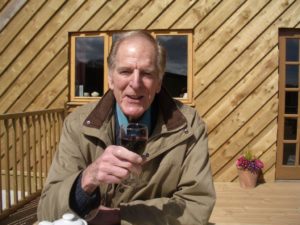 The Gourd family are well known in Bishopsteignton for being the family who ran the transport. Starting with a horse drawn cart the family business grew to embrace modern technology with buses, coaches, cars and trucks.
The Gourd family are well known in Bishopsteignton for being the family who ran the transport. Starting with a horse drawn cart the family business grew to embrace modern technology with buses, coaches, cars and trucks.
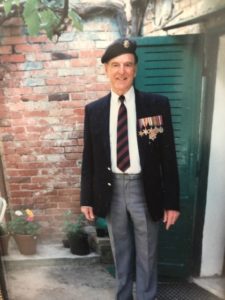 Philip Charles was the youngest surviving son of Henry and Thirza Gourd and inherited and built the Furniture Removals side of the transport business.
He also had a distinguished career in the Coldstream Guards in Tunisia and Italy during WWII, and his memories have been preserved by the Imperial War Museum in their sound archive:
www.iwm.org.uk/collections/item/object/80018885
Philip was survived by his son David and daughter Joanne.
A full article about Philip, in his own words, is here;
https://www.bishopsteigntonheritage.co.uk/people/philip-gourd-in-his-own-words/
Transcription Hide
Philip Charles was the youngest surviving son of Henry and Thirza Gourd and inherited and built the Furniture Removals side of the transport business.
He also had a distinguished career in the Coldstream Guards in Tunisia and Italy during WWII, and his memories have been preserved by the Imperial War Museum in their sound archive:
www.iwm.org.uk/collections/item/object/80018885
Philip was survived by his son David and daughter Joanne.
A full article about Philip, in his own words, is here;
https://www.bishopsteigntonheritage.co.uk/people/philip-gourd-in-his-own-words/
Transcription Hide

Jim Quantick
Jim Quantick was born and bred in Bishopsteignton. He went to school in what is now the Community Centre. As a child he carried milk to properties on the main road and attributes his first job to one of his clients there.
He apprenticed as a carpenter/joiner and later became a district councillor. He was prominent member of the Bowls club and the Cricket club in the village and had a role as Harbour Commissioner.Corinne Darville
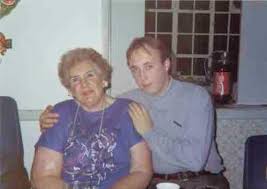
Jean Knapman, 1938-2018
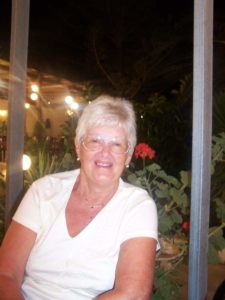
Jean Knapman worked as Parish Clerk for some 18 years, was part of the organisation of the Children’s Theatre company in the village, was involved in the brownies and the guides and helped raise money for the village to buy the Community Centre. She was also president of the Flower Club for many years. She was a well-known and popular member of the community.
Roy Halsey
Roy moved from Watford in Hertfordshire and started his own printing business. Within three years he had become Chairman of the Garden Club. The Club has been increasingly popular over the years and still has many members in the village. Roy himself is somewhat of a Rose expert and has given talks to other clubs and societies in the area. He and his wife have organised the Village show at the Community Centre for some twenty-three years.
Edward Perkin, 1924-2012
Edward Perkin’s family had farmed in the area for many years, and when Edward left the RAF after WWII he returned to the village and took up where his father had left off. He was instrumental in the scheme to purchase the Community Centre, and also in the raising of funds to provide a home for the local Scouts and Guides. Edward will be remembered by villagers for his performances with the Bishopsteignton Players, and also for his championing of memorial benches in the village, many of which still exist, including his own memorial bench in the field above the railway bridge at the top of Luxton Steps.
John Sullivan, 1933-2016
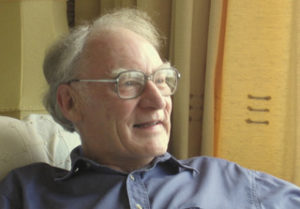
John Sullivan moved to Bishopsteignton in the 1960’s. As Chairman of the Bishopsteignton Twinning Committee John Sullivan was instrumental in starting the original twinning process in 1988, culminating in a charter which links the village to its French counterpart, La Roche Maurice, in 1995.
The French villagers asked for a gift of a red telephone box, which was duly delivered, and in exchange Bishopsteignton received a French postbox, which can be seen on the exterior of the Community Centre. The twinning Association is still going strong today.
John was also active in the village museum and, with his wife Maggie, built a beautiful model of the village as it looked in the 19th century.
Other “Village Voice” interviews coming soon
Dick Searle
Sue Maxwell
Other interviews
David Quantick
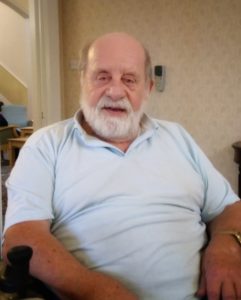
Recorded 8th March 2019 by Paddy Harris and Ken Irvin
David has lived in Bishopsteignton virtually his entire life. He was born in Teignmouth in 1936 and lived as a child in a bungalow along Coombe Way. He tells us of living with oil lamps and no electricity, being bombed by the Germans, having your fish and chips collected by the Gourd’s bus driver and milk deliveries dispensed by the ladle at your door. Different times!
His family later moved into the village where David lived for much of his adult life. David is now a resident of Bishopsteignton House where we caught up with him in March 2019.
